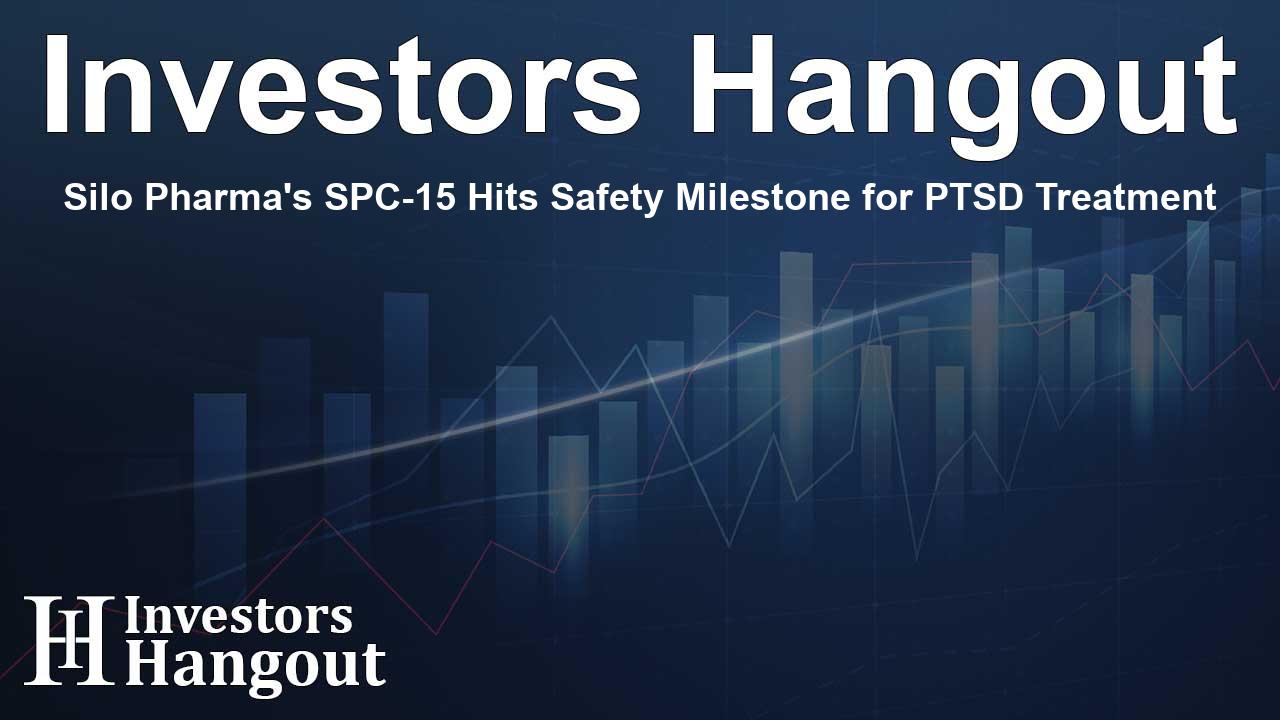Silo Pharma's SPC-15 Hits Safety Milestone for PTSD Treatment

Silo Pharma's Progress with SPC-15 for PTSD
SPC-15’s intranasal spray formulation meets safety standards for clinical trial development
Silo Pharma, Inc. (NASDAQ: SILO), an innovative developmental-stage biopharmaceutical and cryptocurrency treasury company, recently made significant strides in its journey to combat post-traumatic stress disorder (PTSD). The company announced that its lead asset, SPC-15, achieved positive bioanalytical and safety results following a comprehensive safety study among large animals.
Eric Weisblum, the CEO of Silo Pharma, expressed optimism regarding the study outcomes. He stated, "The positive results validate that the formulation and administration profile of SPC-15 meets necessary safety standards for clinical trials. While the safety of our oral version is well understood, we aimed to create a viable intranasal therapeutic solution that not only adheres to safety guidelines but also offers distinct benefits over oral delivery methods. We are excited about the promising potential of our intranasal formulation that supports a swift and user-friendly administration for PTSD treatment."
The conducted preclinical study focused on comparing the safety profile of SPC-15’s intranasal spray to its oral counterpart. Remarkably, the data illustrated that the intranasal administration of SPC-15 at representative therapeutic doses exhibited both local and systemic safety without any identified toxicities. Moreover, the systemic exposure from the intranasal route was found to be comparable to standard oral dosing, further endorsing SPC-15 as a targeted therapeutic for individuals grappling with PTSD and related anxiety disorders.
Building on these findings, Silo Pharma is expressing confidence in its regulatory strategy under the FDA’s 505(b)(2) pathway for SPC-15. This approach enables the company to leverage previous safety and efficacy data from already approved drugs, thereby streamlining the approval process and potentially lowering the associated development costs.
Next Steps for Silo Pharma
Currently, Silo Pharma is advancing into the next phases of drug development. The company is actively conducting an Investigational New Drug (IND)-enabling toxicology study that complies with Good Laboratory Practice (GLP) guidelines. Additionally, work is underway on a device study for the formulation-specific nasal spray delivery system, which aims to optimize the therapeutic experience. Silo is also in the process of assessing several clinical contract research organization (CRO) sites for the initiation of first-in-human clinical trials.
The Market Landscape for PTSD Treatments
The market for PTSD treatments saw significant growth recently, valued at approximately $1.8 billion in the previous year. Experts predict that this market could expand to around $3.2 billion in the next decade, driven by a greater focus on mental health interventions and the escalating demand for personalized care solutions. This translates into a promising opportunity for Silo Pharma as it navigates the complex path of drug development.
About Silo Pharma
Silo Pharma operates as a diversified biopharmaceutical company, with a keen focus on developing treatments for underserved medical conditions, such as chronic pain and central nervous system diseases. The company’s extensive portfolio comprises innovative therapeutic programs including SPC-15 for PTSD, SP-26 targeting fibromyalgia, and additional preclinical research into Alzheimer's disease and multiple sclerosis. Notably, Silo collaborates with top-tier universities and laboratories to enhance the research and development process.
Why SPC-15 is Groundbreaking
SPC-15 represents a forward-thinking approach in treating PTSD, as its formulation is designed to provide faster therapeutic effects compared to traditional oral drugs. By bypassing the digestive system, intranasal delivery improves bioavailability, which is particularly crucial for patients experiencing acute symptoms. This innovative method could reshape how psychiatric treatments are administered and pave the way for better patient compliance.
Frequently Asked Questions
What is SPC-15 and its purpose?
SPC-15 is a therapeutic candidate developed by Silo Pharma designed for treating PTSD through an intranasal delivery system.
How did SPC-15 achieve its safety milestone?
SPC-15 met safety and bioanalytical standards in a large animal study, confirming its compatibility for clinical trials.
What regulatory path is Silo Pharma pursuing for SPC-15?
Silo Pharma is utilizing the FDA's 505(b)(2) regulatory pathway, allowing for the use of existing safety data to streamline approval.
What is Silo Pharma's focus as a biopharmaceutical company?
Silo Pharma aims to address underserved medical conditions, concentrating on stress-induced psychiatric disorders and related illnesses.
What market prospects exist for PTSD treatments?
The PTSD treatment market is projected to grow significantly, with estimates predicting values of up to $3.2 billion in the coming years, driven by increased mental health awareness.
About The Author
Contact Hannah Lewis privately here. Or send an email with ATTN: Hannah Lewis as the subject to contact@investorshangout.com.
About Investors Hangout
Investors Hangout is a leading online stock forum for financial discussion and learning, offering a wide range of free tools and resources. It draws in traders of all levels, who exchange market knowledge, investigate trading tactics, and keep an eye on industry developments in real time. Featuring financial articles, stock message boards, quotes, charts, company profiles, and live news updates. Through cooperative learning and a wealth of informational resources, it helps users from novices creating their first portfolios to experts honing their techniques. Join Investors Hangout today: https://investorshangout.com/
The content of this article is based on factual, publicly available information and does not represent legal, financial, or investment advice. Investors Hangout does not offer financial advice, and the author is not a licensed financial advisor. Consult a qualified advisor before making any financial or investment decisions based on this article. This article should not be considered advice to purchase, sell, or hold any securities or other investments. If any of the material provided here is inaccurate, please contact us for corrections.
